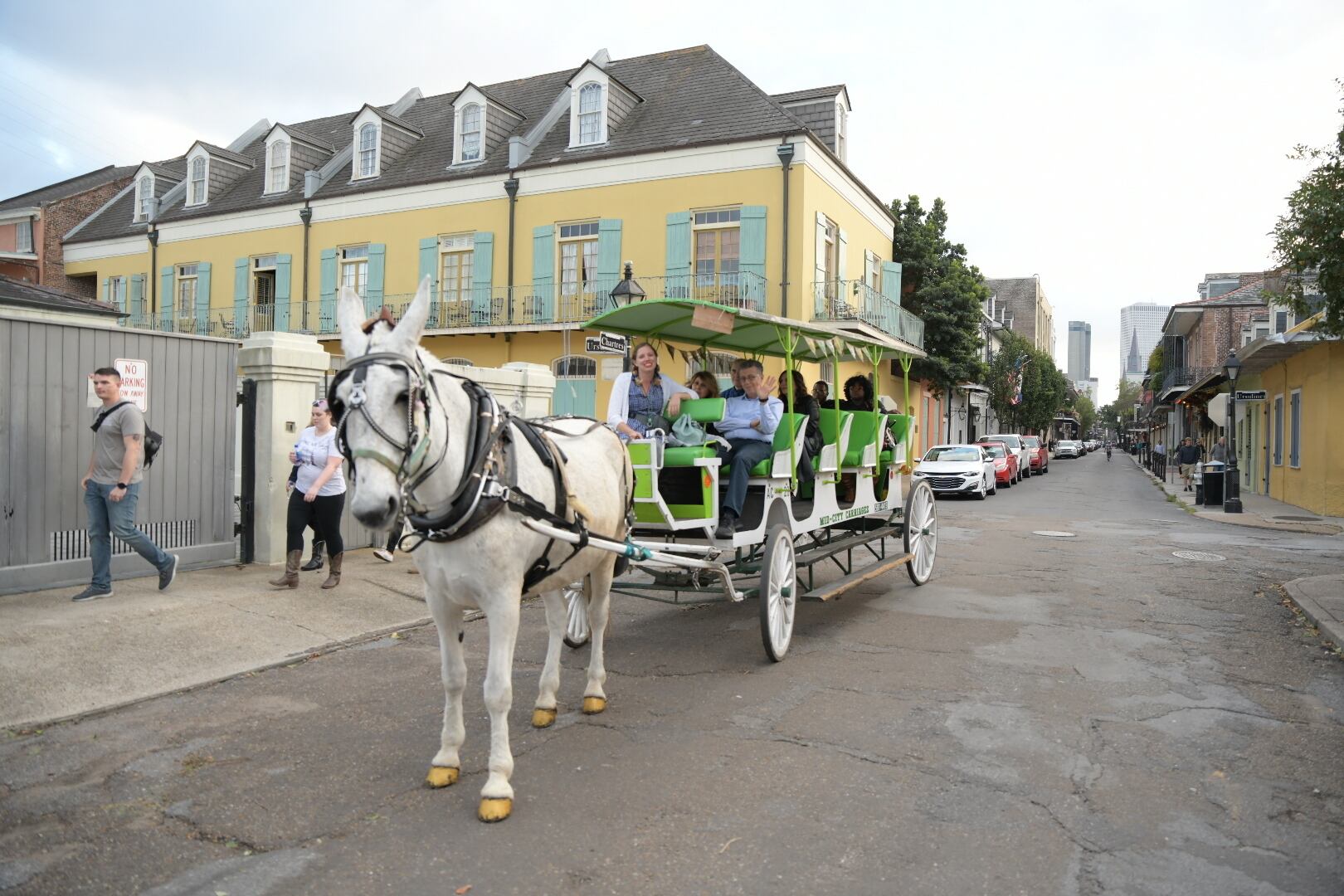Unlike many industries hit hard by the economic downturn, tour guides in New Orleans never saw a decline in business. Carriage drivers like Charlotte Jones were giving tours right up until the city's stay-at-home order went into effect.
"We were actually very busy when the severity of the pandemic really came to light. So it was almost like that last weekend we worked," Jones remembered, "was not really a cash grab, but our last one big gulp of air before going underwater."
"I think a lot of us tried to just do as many tours as possible on that Saturday [March 14]. But on that Sunday it was clear we should not work. And on Monday, we were shut down," she said.
Jones has been driving carriages through the French Quarter for three years. Her buggy, led by a mule named Chica, allows the self-proclaimed "history practitioner" to share the rich history of New Orleans with the millions of visitors that flock to the southern city every year.

Louisiana has been hit hard with COVID-19 cases, and its tourism-reliant economy is bearing the brunt of the illness.
"Even if my colleagues were able to go out and conduct tours at six feet apart, it's in no one's best interest right now, particularly since our health and safety comes first," Jones explained.
Tour guides face unique challenges in finding relief from the economic realities of coronavirus. Jones explained several of these in a recent column in Big Easy Magazine and reiterated her concerns in conversation with Cheddar.
"Relief, particularly foundation relief," Jones said, "has been practically nonexistent for tour guides. There are a lot of initiatives geared toward hospitality and service-industry workers."
Tour guides, Jones explained, have been largely left out of relief efforts. That includes a push to tap into the cash reserves of the New Orleans Convention Center to support hospitality workers. Tour guides are not included in that initiative.
She hopes the tourism industry will find "meaning" in this experience, particularly to better advocate for each other in the future.
"I think the tourism industry, particularly tour guides, need to be more communicative with each other," Jones said. "Instead of us working so autonomously, we need to figure out some way to come together. If it's a coalition, an alliance, whatever. We need to be more cohesive in the future."
In the here and now, there is still a myriad of challenges for the people who interface with visitors. Even applying for government assistance has not been easy.
"A lot of tour guides are still trying to even get on the phone, get an application through unemployment.," Jones reported. There are positive signs, though.
"Others are finally getting that money, much-needed relief, that they were initially denied because they were 1099 [independent contractors]," she said. Independent contractors are typically not eligible for unemployment benefits, but the CARES Act ensures that these workers qualify for assistance.
Jones is not immune to these financial realities. After finding herself unemployed at the height of the tourist season, she applied for unemployment benefits as well.
"It took me two tries to get my application through," she said. "I just kind of let out a big sigh of relief because I was quite lucky getting that done as quickly as I did."
Joking about the "luck of the Irish" because she originally applied on St. Patrick's Day, Jones said she has also received the additional $600 allocated to people receiving unemployment benefits through the CARES Act and her stimulus payment, which relieves some of the financial burdens of being unexpectedly unemployed.
While she waits to hit the streets again with Chica, she is doing her best to stay connected with the mules and the history of New Orleans through research for a Master's program at Tulane University.
"I have plenty of time on my hands, so I can dive into these different rabbit holes of research and it is helping me. It's helping me cope with not seeing Chica or the other mules," Jones explained.
She shared one of her favorite historical tidbits that she has uncovered in her studies.
"Louis Armstrong was working on a coal cart with a mule the day he heard the Great War was over," Jones detailed. "His mule's name was Lady. And he looked at her and said 'I've got to leave you so I can finally play music full-time.' And that was his last job as anything but a musician."
"He at least brought her back to the company, to the barn before he quit," she said, laughing.
Jones is grateful to be staying with family in Florida while waiting out the pandemic and New Orleans' economic shutdown.
Even though she is taking everything one day at a time, she cannot wait to return to The Big Easy.
"I'll go back. I'll be back," she said of the city she's lived in for 12 years. "It's home."



